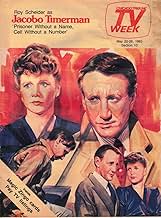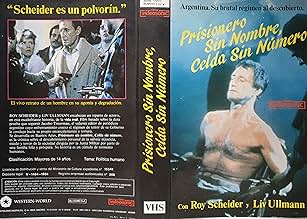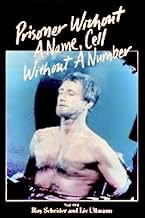Jacobo Timerman: Prisoner Without a Name, Cell Without a Number
- TV Movie
- 1983
- 1h 40m
IMDb RATING
6.1/10
135
YOUR RATING
A well respected journalist in Buenos Aires, the editor of the major newspaper La Opinión, is kidnapped by the military for publishing articles critical of their terrorist tactics.A well respected journalist in Buenos Aires, the editor of the major newspaper La Opinión, is kidnapped by the military for publishing articles critical of their terrorist tactics.A well respected journalist in Buenos Aires, the editor of the major newspaper La Opinión, is kidnapped by the military for publishing articles critical of their terrorist tactics.
Terry O'Quinn
- Colonel Thomas Rhodes
- (as Terrance O'Quinn)
Storyline
Did you know
- TriviaBased on Jacobo Timerman's autobiographical book "Prisoner Without a Name, Cell Without a Number", released in 1981.
Featured review
A quite interesting and highly unusual view of a South American dictatorship as told by its backers (yes, the United States) on film, which is quite rare since it's
Hollywood's view on issues that happened in countless countries in South and Central America - in this film case, Argentina's military regime is depicted in the real
life story of Ukranian born newspaper editor Jacobo Timerman (Roy Scheider) and his prison and torture after publishing damning stories about the terrorist acts
conduct by the military against civillians and members of opposition in their persecution against Communists.
While I liked the movie because of several topics that were different, unexpected and barely shown in similar films based on real life story about the military regimes that happened in Latin America, the movie falters a bit with a simplistic script that doesn't explain certain things, it feels too rushed and half assed at parts, slightly confusing as well, and we never fully understand Jacobo's huge importance to the media scenary in Argentina to the point where they keep him alive time and again, and end up getting a quite peculiar prison sentence with house arrest (that's a first, one and only I've ever seen when it comes to situations like his when usually either you were considered "innocent" afterwards and released after naming names of potential subversive figures or partners in crime or you get killed and disappear for good).
Maybe because it's a view from the outside rather than a film made by Argentina that the movie got a little hurt, simple-minded and quite obscure if compared to similar themed movies such as "The Official Story" (also from Argentina) - and as exception to the rule I just mentioned there "State of Siege" by Costa Gavras which is a superb movie about the regime in Brazil and it was done abroad, somehow the director made a palatable film that had its urgency. Perhaps the problem with this film here is that it's just a TV project rather than a cinema project so we understand its limitations.
Other than this slighly minor criticism of mine, there are plenty of unseen elements that happened in this particular case that left me impressed and enraged through the whole experience and that made it all worth seeing. Jacobo's persecution and torture goes beyond limits and it goes further than his opposition to the military. He's also persecuted for being Jewish, considering a Zionist militant devoted to a cause of Argentina's domination by the Jewish community (a very absurd accusation). And when we get to his house arrest, the level of absurd is beyond belief to the point of the man not being able to use a typewriter neither a pencil to write his thoughts about anything along with other arbitrarities commited by the military force. It was a brtual and insane ordeal.
Scheider delivers a good performance in the title role, considering what he was given as script (one that doens't allow actors to have remarkable moments but just focused in telling its story in a straight-forward manner); Liv Ullmann has an almost heroic role as Jacobo's supportive wife and the one who brings the nation's attention to his cause for liberation. And Terry O'Quinn has an interesting and intense brief role as one of the military's torturers. It's a very good drama, a little bit wronged but not in its entirety. For those who know little or nothing about Argentina's dark days during Videla's regime, this is a must-see. 7/10.
While I liked the movie because of several topics that were different, unexpected and barely shown in similar films based on real life story about the military regimes that happened in Latin America, the movie falters a bit with a simplistic script that doesn't explain certain things, it feels too rushed and half assed at parts, slightly confusing as well, and we never fully understand Jacobo's huge importance to the media scenary in Argentina to the point where they keep him alive time and again, and end up getting a quite peculiar prison sentence with house arrest (that's a first, one and only I've ever seen when it comes to situations like his when usually either you were considered "innocent" afterwards and released after naming names of potential subversive figures or partners in crime or you get killed and disappear for good).
Maybe because it's a view from the outside rather than a film made by Argentina that the movie got a little hurt, simple-minded and quite obscure if compared to similar themed movies such as "The Official Story" (also from Argentina) - and as exception to the rule I just mentioned there "State of Siege" by Costa Gavras which is a superb movie about the regime in Brazil and it was done abroad, somehow the director made a palatable film that had its urgency. Perhaps the problem with this film here is that it's just a TV project rather than a cinema project so we understand its limitations.
Other than this slighly minor criticism of mine, there are plenty of unseen elements that happened in this particular case that left me impressed and enraged through the whole experience and that made it all worth seeing. Jacobo's persecution and torture goes beyond limits and it goes further than his opposition to the military. He's also persecuted for being Jewish, considering a Zionist militant devoted to a cause of Argentina's domination by the Jewish community (a very absurd accusation). And when we get to his house arrest, the level of absurd is beyond belief to the point of the man not being able to use a typewriter neither a pencil to write his thoughts about anything along with other arbitrarities commited by the military force. It was a brtual and insane ordeal.
Scheider delivers a good performance in the title role, considering what he was given as script (one that doens't allow actors to have remarkable moments but just focused in telling its story in a straight-forward manner); Liv Ullmann has an almost heroic role as Jacobo's supportive wife and the one who brings the nation's attention to his cause for liberation. And Terry O'Quinn has an interesting and intense brief role as one of the military's torturers. It's a very good drama, a little bit wronged but not in its entirety. For those who know little or nothing about Argentina's dark days during Videla's regime, this is a must-see. 7/10.
- Rodrigo_Amaro
- Sep 28, 2022
- Permalink
Details
Contribute to this page
Suggest an edit or add missing content

Top Gap
By what name was Jacobo Timerman: Prisoner Without a Name, Cell Without a Number (1983) officially released in Canada in English?
Answer




























